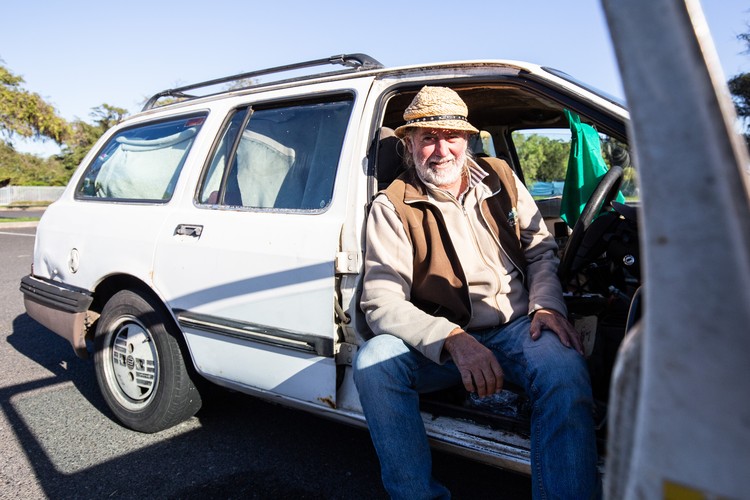
12 August 2022
Dane Herrington calls his 1984 Ford Sierra “The Great White”. Purchased in 1989, the car has clocked up hundreds of thousands of kilometres on South Africa’s roads. For ten years, he has lived in his car. Photo: Ashraf Hendricks
When Dane Herrington goes to bed, he moves his belongings, books and clothing to the front of his beloved 1984 Ford Sierra. He sleeps on a large mattress at the back. He uses a shower at a petrol station. For ten years, he has lived in his car.
Since 1989, when he bought the “The Great White” Sierra, the qualified horticulturist, who is now 64, has clocked up hundreds of thousands of kilometres in pursuit of short-term work opportunities in Cape Town, Johannesburg, Pretoria and Waterval.
Unable to secure long-term work, he found himself homeless, with only his car. It was “a slow descent to where I am now”, he says. He doesn’t want to live in a car, he says.
He has his old age grant, a little money from family abroad, and help from people in the community. He says the increase in fuel prices has hit him hard.
For the past few years, he has been living in and around Table View.
Herrington avoids shelters for the homeless. They are too “crammed”, he says.
“It’s not the environment for someone who’s living in his car. I’ve got possessions in there, and they could get stolen … Whether it’s parked on the premises or not, it makes no difference,” he says.
Herrington thinks the City of Cape Town should allow people who have only their cars to live in, to park at abandoned caravan parks or covered parking lots with ablution facilities, for a small fee. “If you’re running your car, you’ve got to have some money,” he says.
But City bylaws make it illegal to live in your vehicle on public property, except in a “dire emergency or in a designated rest area”. Wayne Dyason, spokesperson for City law enforcement, said fines ranged from R300 to R500.
To avoid issues with police or “the ratepayers”, Herrington parks on the grounds of a church in the evening. He leaves around 4am, before people arrive.
He spends most of his day in the library, “my office”. He uses the facilities there to email. He is also working on a book – “Enjoy the Ride”.
How many people are now living in their cars, nobody really knows. Herrington says that there are plenty of people living in cars but “you just don’t see them … They park in certain places where the cops can’t see them.”
He put GroundUp in contact with Beryl, who is 71. She did not want her full name published.
Beryl has lived for the past year with her 37-year-old son in a four-door sedan.
“It’s driving my son crazy,” she says.
They were each fined R300 for sleeping in the vehicle. “I can’t pay it,” she says. She has a court date in September.
Beryl has her old age grant and occasionally gets work, such as dog sitting. She spends about R450 a month on petrol for the car. “If you don’t drive it every day, the battery goes flat,” she says.
They have a gas stove for cooking and two small solar panels for charging devices. She swims in the sea and showers on the beach if it’s not too cold.
“I didn’t choose to be where I am,” she says.